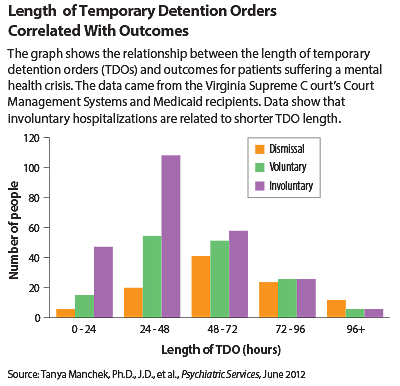Short, Temporary Detentions Make Commitment More Likely
Abstract
Research has shown that temporary detention orders (TDOs) that are 48 hours or shorter are sometimes inadequate to evaluate patients fully after they have suffered a mental health crisis. This can lead to involuntary hospital commitments that can increase stigma and trauma.

Tanya Wanchek, Ph.D., J.D., with the Weldon Cooper Center for Public Service, and Richard Bonnie, LL.B., an attorney with the School of Law, both professors at the University of Virginia, looked at the length of TDOs and correlated that information with the percentage of mental health commitments and dismissals.
The researchers expected a correlation between longer TDO length and an increase in dismissals. Because states have different TDO periods, they used Virginia as an example of states with shorter TDO periods: while most states require a commitment hearing within four to eight days, and three states allow up to 30, Virginia is one of the few states that has a 48 hour detention period. However, this period can be extended to up to five days because of weekends and holidays.
Researchers gathered data on Medicaid hospitalization claims and compared those data with the Virginia Supreme Court’s Court Management Systems to track commitment hearing outcomes in 2008. The data set (n=500) included 356 white individuals (71 percent), 130 black individuals (26 percent), and 14 individuals (3 percent) of other ethnicities. Sixty-two percent of the subjects were female; 31 percent were diagnosed with a schizophrenia disorder, and 46 percent were diagnosed with affective psychosis.
The study results showed that shorter TDO periods (less than 48 hours) had a direct relationship to higher numbers of involuntary commitments, while longer TDO periods had a direct relationship related to higher numbers of dismissals and voluntary commitments.
“The benefits of longer TDO length are that it allows evaluators more time to conduct a thorough evaluation, provides an opportunity to individuals in crisis to stabilize, and increases the likelihood that the subsequent hospitalizations will be voluntary,” Wanchek told Psychiatric News. “These benefits have prompted the Virginia Tech Review Committee, the Office of Inspector General, and the Commission on Mental Health Law Reform to recommend longer TDO periods [in Virginia legislation].”
Researchers cited the investigation of the Virginia Tech shooter in 2007 as a reason to extend the detention period. The inspector general for mental health, mental retardation, and substance abuse services said the short period from detention to the commitment hearing “makes it very difficult, if not impossible, to collect and consider additional collateral information about the individual. This also makes it difficult to complete the physical exam and psychiatric evaluation, assessment, and treatment plan before the commitment hearing is held.”
Wanchek and her colleagues also noted some limitations of the report. Bias about the individual’s health can influence the length of the TDO and hospitalization; for example, researchers mentioned that clinicians sometimes fast-track patients into involuntary commitment because they are familiar with the patient.
However, clinicians may not have control over TDO hearings either. For example, an informal study performed by Virginia’s Commission on the Mental Health Law Reform found that some jurisdictions schedule TDO hearings every other day; therefore, when an individual is detained, his or her hearing will take place on the next scheduled hearing day rather than being scheduled by the clinician. This could mean that the patient’s health is not the primary factor in determining TDO length.
The researchers noted that even though this study identifies the relationship between TDO periods and results of commitment hearings and hospitalizations, more research is needed to determine the costs of increased TDO periods. 
An abstract of “Use of Longer Periods of Temporary Detention to Reduce Mental Health Civil Commitments” is posted at http://ps.psychiatryonline.org/article.aspx?articleid=1151384.



